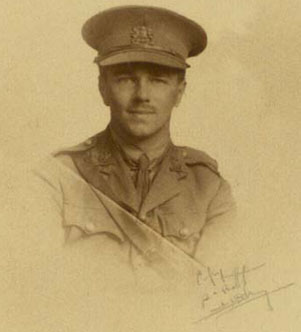For the soldiers in the trenches life was hell, and so writers who had lived through this hell denounced its horrors and the errors that provoked them. The first were the war poets, of all nationalities, not just British ,often writing in the trenches or in hospital wards where they were recovering from wounds.
The war poets expressed their anger about the "stupidity" of the First World War, and depicted the anxieties and the forced immobility and passivity of soldiers in the trenches.
This denunciation had success, because only the poets who took part in the war could fully understand its horror and dimension.

Wilfred Owen:
He was one of the most significant war poets. He was born in 1893 in Britain, then he moved to French, but he came back in 1915 to enlist in the British Army. Deeply shocked by the horrors of the war, he caught trench-fever on the Somme and was hospitalised in Scotland, where he met Sigfried Sassoon, whose encouragement and criticism enabled him to find his poetic voice. He went back to fight in France in 1918, but was killed on the Sombre Canal one week before the Armistice was signed.

The experience of war led him to reject totally not only the traditional pieties of Georgian verse, but also its stylistic features . He can be considered a true innovator: the force and the originality of his language, together with the harsh realism and the intense pity he expresses in his verses make his poems unforgettable. The striking power of some of his lines, the brutal realism of other ones, the simplicity of language and the passionate, unsentimental pity cannot fail to impress and spell-bind the reader of his verses. He was a technical innovator because of his extensive use of half-rhymes, assonance and alliteration and because of the way that physical detail conveys a vision of horror and apocalyptic desolation.
His fame was posthumous: he had only four poems published in his lifetime. His poems show a disconcerting maturity for a man of his age and above all they display a radically new way of writing poetry.
A Letter from the Trenches, Collected Letters:
Written the 16th January 1917, this letter reports first-hand experience on the battlefield: Owen speaks about the last attack, showing the difficulties of acting in the mud and the devastation of dead soldier when the battle has finished.
Dulce et Decorum Est, Collected Poems:
This poem is the Owen’s statement of the horror of war and the hypocrisy and ignorance of patriotism, and sending young men to their deaths. The central part of the poem deals with the terrible new chemical weapon: gas. The scene is relived as a nightmare, with men drowning in a green sea of gas. The soldier-poet emerges to the awful reality of the last stanza, where he follows the wagons carrying dead or dying bodies. He asks the stay-at-home reader to come along and see for himself the ugly face of death. The last two lines are a Horace’s Latin tag, bitterly ironic.